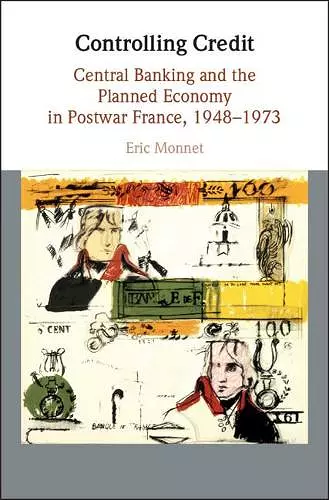Controlling Credit
Central Banking and the Planned Economy in Postwar France, 1948–1973
Format:Hardback
Publisher:Cambridge University Press
Published:15th Nov '18
Currently unavailable, and unfortunately no date known when it will be back
This hardback is available in another edition too:
- Paperback£36.99(9781108400084)

Monnet analyzes monetary and central bank policy during the mid-twentieth century through close examination of the Banque de France.
This book provides a new perspective on the history of central banking, finance and growth before the financial liberalization of the 1980s. Monnet combines economic and historical methods in a novel way that will appeal to historians, economists, political scientists, and policymakers interested in current financial and monetary policies.It is common wisdom that central banks in the postwar (1945–1970s) period were passive bureaucracies constrained by fixed-exchange rates and inflationist fiscal policies. This view is mostly retrospective and informed by US and UK experiences. This book tells a different story. Eric Monnet shows that the Banque de France was at the heart of the postwar financial system and economic planning, and that it contributed to economic growth by both stabilizing inflation and fostering direct lending to priority economic activities. Credit was institutionalized as a social and economic objective. Monetary policy and credit controls were conflated. He then broadens his analysis to other European countries and sheds light on the evolution of central banks and credit policy before the Monetary Union. This new understanding has important ramifications for today, since many emerging markets have central bank policies that are similar to Western Europe's in the decades of high growth.
'How central banks and governments used directed credit to positively influence post-World War II economic recovery and growth - and why similar policies do not work today - is one of the great unsolved mysteries of twentieth-century economic history. In this pathbreaking volume, Eric Monnet uses the French case to shed important new light on the question.' Barry Eichengreen, George C. Pardee and Helen N. Pardee Professor of Economics and Political Science, University of California, Berkeley
'Monnet's intensive study of the Banque de France during the Trente Glorieuses sheds new light on the development of credit policy in the decades before the central banking orthodoxy of the 2000s. It thus makes an important contribution to understanding the development of central banking in Europe and reminds us of the heterogeneity of central bank practice in the twentieth century.' Catherine Schenk, University of Oxford
'Controlling Credit is a valuable book and will remain an inescapable reference in the emerging literature about postwar central banking.' Stefano Ugolini, Journal of Interdisciplinary History
ISBN: 9781108415019
Dimensions: 235mm x 156mm x 22mm
Weight: 620g
350 pages